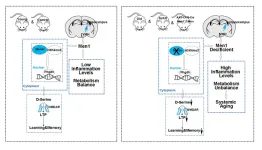(Press-News.org) Hypertension remains poorly controlled worldwide and is becoming more common. Lifestyle changes and blood pressure-reducing drugs are the mainstays of therapy for hypertension, but despite widespread availability of these approaches, many patients with hypertension are not adequately treated. Those with uncontrolled hypertension are at increased risk of heart attack, heart failure, kidney disease and stroke.
A recent study published in JAMA demonstrates the effectiveness of a procedure done under the skin, similar to placing a stent, to treat uncontrolled hypertension, or blood pressure that cannot be controlled despite the use of blood pressure control drugs and agents. This minimally invasive procedure uses ultrasound energy delivered through a small balloon to denervate, or cut off the nerve supply of, the renal artery (RDN), or the main blood vessel that supplies blood to a kidney. Renal Denervation is used alone or as a supplement to blood pressure medication and targets the overactive kidney nerves. This was a randomized, clinical trial with 224 patients with uncontrolled hypertension. The trial was co-authored by Stephen Jenkins, MD, FACC, FSCAI, FSVM, the Section Head of Interventional Cardiology and the Director of Interventional Cardiology Research at Ochsner Health.
"Ochsner Hospital participated in the RADIANCE-HTN series of trials which studied the effect of ultrasound renal-denervation in resistant, hypertensive patients,” Dr. Jenkins said. “In this pivotal, randomized, multinational trial, Ochsner Hospital was the number 2 enroller in the United States. This simple catheter-based procedure offers an alternative to drug treatment for hypertension by reducing sympathetic nerve activity to arteries which precipitates high blood pressure.”
In addition to lifestyle changes and pharmacotherapy, endovascular catheter-based renal denervation (RDN), a minimally invasive procedure that involves a small incision, has emerged as treatment for resistant hypertension. The traditional RDN procedure uses radiofrequency ablation to burn the nerves in the renal arteries, leading to the kidneys. This process causes a reduction in the nerve activity, which decreases blood pressure.
The uRDN system, a minimally invasive procedure to treat overactive nerves is performed by inserting a small flexible catheter through a small puncture in the wrist or groin. The catheter is then placed in the artery supplying the kidney. Either radiofrequency or ultrasound energy is delivered to the tissue surrounding the artery for several seconds which decreases nerve activity and decreases blood pressure. The device is removed after both kidneys are treated during the procedure.
Two sham-controlled trials previously demonstrated that ultrasound renal denervation (uRDN) decreases blood pressure (BP) in patients with mild-moderate and resistant hypertension. This larger, pivotal trial done in patients with uncontrolled hypertension expanded upon these efficacy and safety observations.
In the Radiance II trial, co-authored by Jenkins, demonstrated positive results even for those with uncontrolled hypertension, with lower blood pressure sustained two months after treatment. This means uRDN is an alternative to medical therapy, effective BP-lowering therapy for hypertensive patients.
In addition, pooled analysis results from the RADIANCE SOLO, RADIANCE TRIO, and RADIANCE II were concurrently published in JAMA Cardiology. Analysis included data from more than 500 patients with mild-moderate to resistant hypertension randomized in the three studies. Results of the pooled analysis showed a consistent blood pressure lowering effect across a broad range of hypertension.
END
New trials show promising, minimally invasive procedure to treat resistant hypertension
2023-03-16
ELSE PRESS RELEASES FROM THIS DATE:
Dedicated Neuroendocrine Tumors Program launched at Sylvester Comprehensive Cancer Center
2023-03-16
MIAMI, FLORIDA (March 16, 2023) – Aman Chauhan, M.D., and Sylvester Comprehensive Cancer Center at the University of Miami Miller School of Medicine have embarked on a mission to make Sylvester a top-level research center for neuroendocrine tumors and to make Miami a first-choice destination for patients seeking treatment for these complex cancers.
Chauhan, an internationally recognized neuroendocrine expert and the newly named leader of Sylvester’s Neuroendocrine Tumor Program, has devoted his career to neuroendocrine ...
Leading MS/PML experts recommend genetic testing to prevent fatal brain infection
2023-03-16
In an editorial in the journal Frontiers in Neurology, two leading multiple sclerosis (MS) experts are advocating for genetic testing to identify MS patients who are at higher risk of developing a devastating side effect from their medications.
People with MS are faced with the excruciating decision of whether they should take medications that are effective in slowing the progression of the disease, but may also trigger this potentially fatal complication, a rare brain infection called progressive multifocal leukoencephalopathy (PML).
The ...
Protein engineers navigate toward more targeted therapeutics
2023-03-16
More than a third of FDA-approved drugs work by targeting a G protein-coupled receptor, or GPCR. The human body has more than 800 types of GPCRs that provide cells with information about the external environment to calibrate responses. Drugs that either block or activate GPCRs are used to treat a wide range of diseases including hypertension, pain and inflammation. Most drugs bind to the outside of the receptor, but this can result in adverse side effects since receptors often resemble one another.
In a new study published in Nature, Sivaraj Sivaramakrishnan, a professor in the College of Biological ...
Antibody fragment-nanoparticle therapeutic eradicates cancer
2023-03-16
ITHACA, N.Y. -- A novel cancer therapeutic, combining antibody fragments with molecularly engineered nanoparticles, permanently eradicated gastric cancer in treated mice, a multi-institutional team of researchers found.
The results of the “hit and run” drug delivery system, published in the March issue of Advanced Therapeutics, were the culmination of more than five years of collaboration between Cornell, the Memorial Sloan Kettering Cancer Center (MSKCC) and biopharmaceutical company AstraZeneca.
“I’ve seen beautiful ...
Childhood volunteering encourages future voting in elections, study shows
2023-03-16
Childhood volunteering encourages those from politically disengaged homes to go on and vote when they are older, a major new study shows.
Community action leads to them becoming more interested in politics and to see voting as a duty, according to the research.
However volunteering didn’t have the same impact for most children, so it shouldn’t be seen as the answer to falling voter numbers.
The research was carried out by Dr Stuart Fox, now at the University of Exeter and conducted while he worked at Brunel University. He used the United Kingdom Household Longitudinal Survey and structural equation modelling to examine ...
Extinct animals on islands cannot be replaced
2023-03-16
Lush plants, large trees and many different, beautiful and colorful exotic animals. This is probably how most people imagine the small island of Mauritius in the Indian Ocean.
But that may not be the case. As in several other places in the world, the island and its nature are at risk of mass extinction, and in just a decade or two the flourishing nature and the many diverse animals may have dwindled to very few.
At least if the extinction of the many plants and animals on the island continues. They are part of a particularly sensitive ...
DNA treatment could delay paralysis that strikes nearly all patients with ALS
2023-03-16
In virtually all persons with amyotrophic lateral sclerosis (ALS) and in up to half of all cases of Alzheimer’s disease (AD) and frontotemporal dementia, a protein called TDP-43 is lost from its normal location in the nucleus of the cell. In turn, this triggers the loss of stathmin-2, a protein crucial to regeneration of neurons and the maintenance of their connections to muscle fibers, essential to contraction and movement.
Writing in the March 16, 2023 issue of Science, a team of scientists, led by senior study author Don Cleveland, PhD, Distinguished Professor of Medicine, Neurosciences and Cellular and Molecular Medicine at University ...
Loss of Menin helps drive the aging process, and dietary supplement can reverse it in mice
2023-03-16
Decline in the hypothalamic Menin may play a key role in aging, according to a new study publishing March 16th in the open access journal PLOS Biology by Lige Leng of Xiamen University, Xiamen, China, and colleagues. The findings reveal a previously unknown driver of physiological aging, and suggest that supplementation with a simple amino acid may mitigate some age-related changes.
The hypothalamus has been recognized as a key mediator of physiological aging, through an increase in the process ...
Dana-Farber researchers chart a course for understanding, preventing, and treating young-onset colorectal cancer
2023-03-16
Colorectal cancer among young people is increasing globally and rapidly. Experts expect it to become the leading cause of cancer death in individuals aged 20-49 in the U.S. by the year 2030.
Yet no one is certain why this disease is suddenly affecting so many young people. In a new paper published in Science, Dana-Farber Cancer Institute researchers outline the complexities of the disease and the research needed to map out a path toward understanding it.
“The rising incidence of young-onset colorectal cancer is extremely concerning, and it is urgent that the scientific community comes together to better understand the underlying ...
Hidden signals play a vital role in evolution of warning coloration in amphibians
2023-03-16
New findings help answer a particularly vexing evolutionary question: how do species that use bright coloration to keep predators away survive long enough for this warning signal coloration to evolve, before predators who can better spot them through their colors learn to avoid them? A study comparing a series of models points to warning color signaling, or aposematism, likely appearing through intermediate steps where coloration is only visible when an organism is fleeing or intentionally displaying a hidden feature. Evolutionary selection to avoid being eaten by predators has driven considerable variation in the diversity of animal ...


